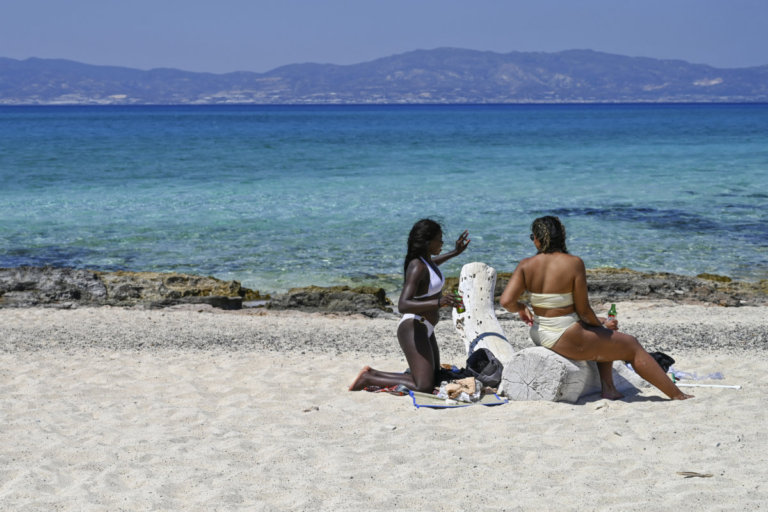
It is popular as an affordable seaside destination, but do foreigners go to study in Greece? According to OECD, it has become increasingly popular for its tertiary education in recent years, particularly for bachelor’s degrees. So if you’ve been considering a lesser-known study destination full of life and wonder, Greece may just be a good place to explore. Here’s why.
Home of ancient knowledge
Philosophy, architecture, and medicine, can all be traced back to Greece, which was one of the earliest civilisations to think, build, and heal. It was where thinkers such as Socrates, Plato, and Aristotle first spread their teachings. Doctors take the Hippocratic oath; Hippocrates was Greek, and known as the founding father of medicine.

Two men look at a tapestry depicting “The School of Athens” during its official presentation at the Greek Parliament on March 22, 2021. Source: Aris Messinis/AFP
On top of that, Athens is widely recognised as the birthplace of democracy and mathematics. Greek symbols are used in maths and physics to this day, and the first theorem was conceptualised by Pythagoras, who was Greek. The country is even home to the Olympic games, which started in 776 BC. All these tell us that there is much to be learnt when you study in Greece; the pursuit of knowledge has always been valued here.
Low cost of education and living
It is free for EU/EAA students to study in Greek public universities (except for select Master programmes). Tuition fees are affordable for other international students too — between 1,500 to 9,000 euros annually. Top universities include the University of Crete, Athens University of Economics and Business, and the Aristotle University of Thessaloniki.
Besides that, it is also comparatively cheaper to live in Greece compared to other education hubs in Europe. You could survive on under 700 euros a month, including rent for a city centre apartment, which would cost between 250 and 450 euros.

This picture shows Greek flags displayed on the Syntagma square in Athens, on March 24, 2021. The Greeks take great pride in culture and family. Source: Angelos Tzortzinis/AFP
Rich history and culture
With civilisations dating back 5,000 years, Greece is home to historic sites such as the Acropolis of Athens, Temple of Poseidon, and the Parthenon (built in 5 BC). Besides the landmarks, you will also get to soak in the unique local culture during your study in Greece. This includes exciting festivities, delectable cuisine, and an altogether laid-back way of life.
The Greek take pride in family, religion, and traditions. They are also warm and friendly, so you can expect to be invited to family dinners. Expect the menu to be rich in vegetables, fruits, seafood, meat, cheese, and lashings of olive oil.
Unique Mediterranean lifestyle
When you study in Greece, you will enjoy one of the most breathtaking Balkan countries, famed for its clear blue waters and safe beaches. Thanks to the warm Mediterranean climate, people here enjoy an outdoor life full of sea, sand, and sunshine almost all year round. Think Santorini, Mykonos, and Carfu; each bustling with tourists looking for idyllic island days and exciting party nights. The country’s unique geography means there are endless natural landmarks to explore, including mountains and caves.

Sunset in Oia, Santorini, which is ready to welcome tourists, including international students. Source: Aris Messinis/AFP
Open to foreigners who want to study in Greece
EuroNews reports that Greece is already working on vaccine passports, as the European Commission hatches a travel plan for vaccinated people in the bloc. The country is building its list of countries that citizens do not need to quarantine upon arrival. Instead, these travellers need only present a vaccine certificate, immune certificate or negative COVID-19 result from May 2021 onwards. If you’re from the United Kingdom, the United States, Canada, Australia, Serbia, Russia, Ukraine, China, the United Arab Emirates, or Saudi Arabia, check details of your country’s bilateral travel agreement with Greece.
It helps that the Greek are open and welcoming by nature. Immigration and diversity are familiar concepts here, as Greeks themselves often leave their home behind to pursue opportunities abroad. They know the feeling of sojourning in foreign lands so well that they even have a name for it: “xeniteia”.










